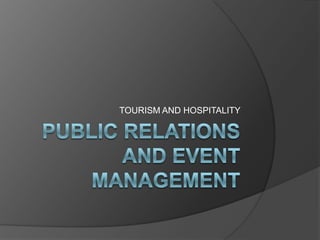Grande Prairie Regional College
- 1. Public relations and event managementTOURISM AND HOSPITALITY
- 2. OutcomesTo learn what Public Relations isTo understand how Public Relations relates to Event Management Tips for planning a successful eventCase study: Crisis Communication and Media
- 3. Public RelationsPublic Relations is the deliberate, planned, and sustained effort to establish and maintain mutual understanding between an organization and its publics
- 4. Careers in Public Relations Media Liaison OfficerCommunity Relations ManagerSpecial Events Coordinator Corporate Communications Advisor
- 6. Planning an Event Raise awareness of your services or products Generate support for a cause Introduce employees to work practices
- 7. Tips for planning an eventAssemble the team Understand the value of research - know your audienceBe strategic with clear goals and measurable objectivesSelect the right venue Engage people's emotions, not just their minds Protect the integrity of your brandPlan, plan, plan - be diligent on detail Document your event results - evaluateShare your event results with the media, stakeholders and partners to maximize promotional value
- 8. International Event Planning Youth building a Latin America without poverty
- 12. Crisis Communication and Media Case study: Divide into three groupsCorporate Event crisis
- 13. Crisis Planning The Reactive PhaseCrisis planning should be implemented, monitored and adjusted 24/7Once crisis is nearly under control, conflict resolution strategies are implemented to minimize damage
- 14. Evaluation Did the anticipated numbers attend? Did the right people show? Were sales or other targets achieved?How many requests for additional information were received? Were new members recruited?
- 15. Tips Set goals and measurable objectives Be pro-activeNetwork
- 16. Questions / Comments?Thank You!
Editor's Notes
- #2: Introduction, who I am, what I doWhat I did – Chile, ATCO, Devon, Stampede Educational Background – About Mount Royal So I’ve never done this before, so bear with me. Interrupt me if you have any questions, I really want this to be a two-way conversation.
- #3: Point 3: Checklist / steps of planning an eventPoint 4: Discussion – I will share some of my experiences and I want to hear yours. Some things that you have faced.
- #4: Now, does this tell you anything? Probably not. It’s in the communications department with journalism, technical writing, broadcasting. So there is a lot fo writing, event planning, media work....a lot of everything. Deliberate: intentional. Your event is designed to influence, gain understanding, provide information and obtain feedback. Planned: systematic, requires research and analysisTwo-way communication: research, pre-planning is going to reflect the outcome. Successful communication with you and the audience. Was the message heard? Received? Understood? Remembered? Acted Upon?
- #6: Can be a fine line between some sectors. For example, the Stampede wage varies in these sectors too, non-profit typically not paying as much but that is changing. Non-profits are starting to recgonize the need to pay better wages to be more successful. Government pays decent, but typically the best one is Corporate. It all depends on what you are looking for: You may gain more experience in non-profit, but make less money. Experiment as a student is when you can experiment with these sectors, volunteer, school projects, to help you figure out where you want to be.
- #7: Special Events is one of the most powerful tools available to communicators. They are powerful because they provide a physical connection between you and the people you need to reach.Very personal MeasurableHigh Profile A lot of options What are some event types? Launches and ceremonies. Trade shows, site visits, product demonstrations and open days. Online events, web forums and virtual tours. Conferences, seminars, meetings, briefings and workshops. Community celebrations, sporting events and cultural occasions. Events offer innovative ways to connect with people on a face-to-face basis, which is becoming increasingly rare in this digital age. There are countless reasons to stage an event and a host of formats for successful activities. The choice of what you do and how you do it depends on your budget, the culture of your organization and, most important, the people you need to reach.
- #9: Know the industry. Know the culture. Know the environment. What cultural practices do they do? What’s safe? What if I can’t understand someone? What if I get lost? Little problems are much more escalated and urgent internationally, especially if you don’t know that language.
- #10: A lot of resources, - staff, budget, supplies, research. Typically corporate events take longer to plan because of all the detail, its great, but don’t get up in theory. It’s easy to read a book that tells you what to do, but with all the time and research it’s easy to loose your adrenaline and excitement, you can get distracted, and miss simple things.
- #11: Good, a lot of support, a lot of time. Very aware of key messaging, different target audience: Some people just do not like government. A little less money and than corporate, more accountability.
- #12: Can go by like a whirl – wind. Event is over and your left thinking “What just happened?” Can be vey chaotic and time demanding. A lot of great people – professionals and volunteers. Volunteers have to be appreciated and treated like employees, because the are so valuable.
- #16: The bottom line Plan for EVERYTHINGMeet people, talk to people, join different organizations















